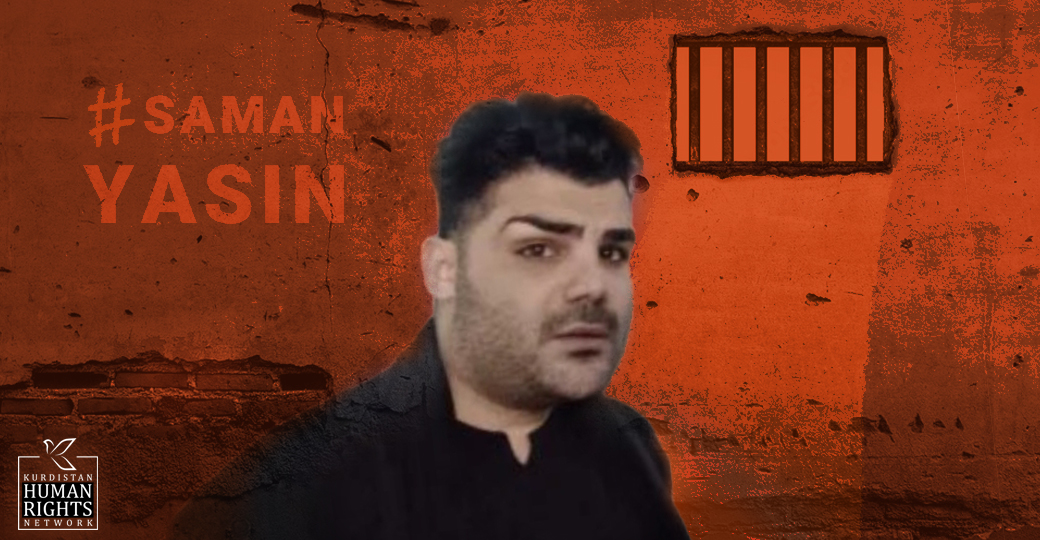Saman Seyedi, known as Saman Yasin, is an artist from Kermanshah, Kermanshah Province, living in Tehran. Before his arrest, he had sung several songs protesting social and economic conditions.
Arrest
Yasin was arrested by security forces at his home in Tehran during the anti-government uprising of Women, Life, Freedom on 2 October 2022, and directly transferred to the Security Prosecutor’s Office in Evin Prison.
He spent the first two weeks of his detention in Fashafouyeh Prison (also known as the Greater Tehran Central Penitentiary) before being moved to Evin Prison.
During the initial weeks of his detention, he was denied visits and contact with his family and was subjected to severe torture for forced confessions, including mock executions, solitary confinement, confinement in a cold room known as “the morgue”, severe beatings, inserting a pen into his nasal cavity, and being thrown from a height.
Judicial Process
On 29 October 2022, the Mizan news agency, affiliated with the Judiciary of the Islamic Republic of Iran, reported on the trial of several detainees from the Women, Life, Freedom uprising, including Saman Yasin.
The Kurdish artist was charged with “enmity against God” (moharebeh), which carries the death penalty in Iran, and “assembly and collusion with the intention of acting against the security of the country”.
Simultaneously, a video of his forced confessions was broadcast on state media, while in subsequent letters and calls from prison, Yasin stated that these confessions were made under severe physical and psychological torture.
In December 2022, he was informed of his death sentence issued by Branch 28 of the Islamic Revolutionary Court of Tehran, presided over by Judge Mohammad-Reza Amouzad.
Although Mohammad Esmaeil-Beygi, the lawyer chosen by Yasin’s family, was not allowed to attend court sessions or access the case files, the sentence was appealed by the court-appointed lawyer, Hossein Sartipi, and sent to the Supreme Court.
In January 2023, the Supreme Court overturned the death sentence due to incomplete investigations and referred the case back to the issuing court for a retrial.
The revised indictment no longer included the charge of “enmity against God” (moharebeh) but accused him of “assembly and collusion with the intent to commit a crime against national security” and “disrupting public order and peace”.
On 11 March 2023, his court-appointed lawyer reported that their request for clemency had been rejected by the Amnesty and Clemency Commission of the Judiciary.
After several postponements, Yasin’s trial was held on 17 April 2024, in Branch 15 of the Islamic Revolutionary Court of Tehran, presided over by Judge Mohammad-Reza Amouzad, on charges of “assembly and collusion with the intent to commit a crime against national security”.
On 21 April 2024, Yasin was sentenced to five years in prison with exile to Shahr-e Babak prison in Kerman Province. His lawyer announced on Instagram that he would appeal the sentence.
Current Status
Yasin is currently imprisoned in Ghezel Hesar Prison in Karaj, Alborz Province.
Additional Information
– On 9 November 2022 Yasin went on a two-day hunger strike in protest at being denied family visits and the uncertainty of his situation in Evin Prison. On the second day, the Security Prosecutor’s Office in the prison contacted his family, allowing them their first cabin visit since his arrest.
– On 28 November 2022 he was suddenly transferred from Evin Prison to Rajai Shahr Prison in Karaj, Alborz Province.
– In November 2022, Amnesty International, in a statement, accused the Islamic Republic of Iran of intending to execute at least 21 people arrested during the protests after holding mock trials in order to intimidate the protesters. Yasin was among the people mentioned in the statement.
– On 7 December 2022, Yasin’s mother released a video message urging the public and human rights organisations to support her son and prevent his execution. She said: “Where in the world have you seen someone lose their life over a trash bin? My son is an artist. Please help save my son from the gallows.”
– On 10 December 2022, Carlos Casper, a German Parliament member from the Social Democratic Party, assumed political sponsorship of Saman Yasin.
– On 13 December 2022, PEN Germany issued a statement supporting Toomaj Salehi and Saman Yasin, granting them honorary membership.
– On 20 December 2022, following the execution of Mohsen Shekari in Rajai Shahr Prison, Yasin attempted suicide by ingesting a large number of pills due to the harsh conditions in Hall 31 of Ward 10 of Rajai Shahr Prison, and the imminent execution of his own sentence. He was found unconscious and transferred to the prison infirmary, where his stomach was pumped and he was given IV fluids. Despite still being semi-conscious, he was initially placed in solitary confinement and later moved to the political ward in Hall 10 of Ward 4, after regaining full consciousness.
– On 6 January 2023, his song “Azadi” (meaning Freedom), recorded over the phone from prison and composed by his friends, was released.
– On 28 January 2023, he was summoned to the guard office of Rajai Shahr Prison under the pretext of being sent to a hospital for surgery and then transferred to Evin Prison.
– On 16 February 2023 he went on a hunger strike in protest at his prolonged status of uncertainty, ending it after five days at the request of his fellow inmates.
– On 28 February 2023, he was moved from Ward 209 of Evin Prison back to Rajai Shahr Prison.
– On 21 July 2023, in an audio message from prison, Yasin stressed that he had been detained for 10 months without having committed any crime, saying that Judge Abolghassem Salavati continued to deny him the right to choose his lawyer, and asked the public to be his voice.
– On 22 July 2023, on the orders of Judge Salavati, he was transferred from Rajai Shahr Prison to Aminabad Psychiatric Hospital in Rey, Tehran Province, and hospitalised for three days, where he was restrained and beaten by security forces and hospital staff after resisting an injection while handcuffed to a bed.
– On 2 August 2023, he was transferred to Evin Prison along with several other prisoners after the closure of Rajai Shahr Prison.
– On 23 August 2023, in an audio message from prison, he recounted the torture he endured during his detention and the pressure to make forced confessions, and described his experience at Aminabad Psychiatric Hospital. He said: “Upon arrival at the hospital, I was forcibly tied to the hospital bed by a group of soldiers and prison staff. My hands were handcuffed and my legs were shackled. An injection I was given left me unconscious for 24 hours.”
On 3 September 2023, Yasin and several other political prisoners were unexpectedly and forcibly transferred from Evin Prison to the “secure” ward of Ghezel Hesar Prison in Karaj by order of the supervising judge Neyri and the prison director Hedayat Farzadi.
– On 23 October 2023, his court session was cancelled for the third time.
– On 29 October 2023, several political prisoners in Ghezel Hesar Prison published a letter highlighting Yasin’s severe physical and mental health issues, warning about his deteriorating condition and emphasizing that there were no grounds for his continued detention.
– On 20 November 2023, political prisoner Ahmad-Reza Haeri wrote a letter describing Yasin’s situation.
– On 22 November 2023, the U.S. Department of State condemned the mock executions, torture, and unjust death sentences in Iran in a post on its official X account, referencing Ahmad-Reza Haeri’s account of the horrifying details of Yasin’s torture and mock execution.
– On 28 January 2024, Yasin was injured in the chest during an attack by prison guards on political prisoners in Ghezel Hesar Prison.
– On 7 February 2024, following the cancellation of his court session once more, Yasin banged his head against the wall in the courthouse out of frustration, causing significant injury.
– On 27 February 2024, in a letter to Gholam-Hossein Mohseni Azhei, the Head of the Judiciary, Yasin referenced his 18 months of uncertainty in detention, writing: “You have staged mock executions and put me in a psychiatric hospital. What more can you do to me? Just take my life and end it. I demand that you execute me. I can no longer bear the uncertainty and imprisonment for a crime that neither you nor I know about. Please issue my death sentence.”
– On 5 March 2024, Yasin was transferred to Aminabad Psychiatric Hospital for the second time and returned to Ghezel Hesar Prison after six days.
– On 17 May 2024, due to a seizure caused by stress, he was transferred to Loghman Hospital and returned to prison after one night.
– On 3 July 2024, in a letter, Ahmad-Reza Haeri warned about Yasin’s condition, mentioning that despite a letter from the Legal Medicine Organisation regarding Yasin’s inability to endure imprisonment, the court overseeing the prison ignored the letter. Haeri also highlighted that four of Yasin’s chosen lawyers had been prevented from representing him or accessing his case by Judge Abolghassem Salavati over the past 20 months.
– On April 2024, Yasin was hospitalised for nasal surgery as his nasal cavity had been torn due to torture during his detention.
Notes:
1. Women, Life, Freedom Uprising: Jina Amini (Mahsa Amini), a 21-year-old Kurdish woman from Saqqez, Kurdistan Province, was arrested on a street in Tehran on 13 September 2022 by the morality police because of the way she was dressed. Shortly after her arrest, she was transferred to Kasra Hospital in Tehran with head injuries and symptoms of brain death, and passed away three days later on 16 September 2022. The government’s killing of Jina sparked unprecedented anti-government protests, which began with a large turnout at her funeral at Aichi Cemetery in Saqqez and quickly spread to many cities across Iran. These widespread protests against the Islamic Republic of Iran, which lasted for several months, resulted in at least 527 protesters being killed and thousands injured and arrested. The protests are known for their central slogan of “Women, Life, Freedom” (Kurdish: Jin, Jiyan, Azadi).
2. Article 279 of the Islamic Penal Code: “Moharebeh (enmity against God) is defined as drawing a weapon with the intention of killing, stealing from, or intimidating people in a way that causes insecurity in the environment.” According to Article 282 of the Islamic Penal Code, “if a person commits the crime of moharebeh, they will be sentenced to crucifixion, execution, amputation of the right hand and left foot, or exile, at the discretion of the judge.”
3. Article 610 of the Islamic Penal Code: “If two or more individuals gather and conspire to commit crimes against the internal or external security of the country or to facilitate the means for committing such crimes, they shall be sentenced to two to five years’ imprisonment, unless they are considered mohareb (those who commit enmity against God).”
4. Article 618 of the Islamic Penal Code: “Anyone who, through uproar, commotion, unconventional behaviour, or harassment of individuals, disrupts public order and peace or prevents people from engaging in their work, shall be sentenced to imprisonment for a period of three months to one year and up to 74 lashes.”










